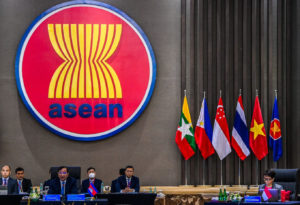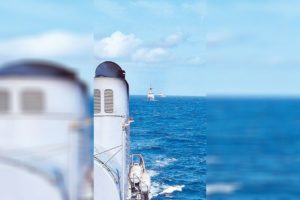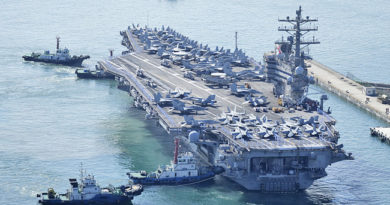OPINION | BABE’S EYE VIEW- Asean statement on South China Sea: the right step forward

In what is seen by many as an unprecedented move, the foreign ministers of the Association of Southeast Asian Nations (ASEAN) issued a stand-alone statement expressing concern about the developments in the South China Sea and reaffirming “the shared commitment to maintaining and promoting peace, security and stability in the region” where tension has been growing over conflicting claims in the South China Sea.
“We closely follow with concern the recent developments in the South China Sea that may undermine peace, security and stability in the region. We reaffirm the importance of maintaining and promoting peace, safety, security, stability and freedom of navigation in and overflight above the maritime sphere of Southeast Asia, particularly the South China Sea,” the statement read.
The six-point statement likewise reaffirmed “the need to restore and enhance mutual trust and confidence as well as exercise self-restraint in the conduct of activities that would complicate or escalate disputes and affect peace and stability,” urging that “actions that may further complicate the situation” must be avoided.
While some have expressed disappointment that the statement seemed very innocuous and “watered down” as it did not specify the “recent developments” that have caused concern and what kind of “activities” have heightened tension in the region – in particular the aggressive actions of China Coast Guard and maritime militia vessels against Philippine Coast Guard vessels and resupply boats that include the spraying of high-pressure water cannons, pointing of military grade lasers and dangerous maneuvers with incidents of collision in areas that fall within the Philippines’ exclusive economic zone – many find it significant that the statement urged “full respect for legal and diplomatic processes, without resorting to the threat or use of force, in accordance with the universally recognized principles of international law, including the 1982 United Nations Convention on the Law of the Sea (UNCLOS).”

The hesitation by other ASEAN members to call out China is also understandable since these countries have a close relationship with China, particularly economic, as it is the biggest trading partner of ASEAN. Nevertheless, many found it notable that aside from underscoring the “peaceful resolution of disputes,” the statement repeated the phrase “universally recognized principles of international law” – recalling that in 2013, the Philippines filed a case against China’s expansive claims in the South China Sea before the Permanent Court of Arbitration at The Hague under Annex VII of the UNCLOS. In 2016, the Philippines received a favorable ruling that China refuses to recognize to this day, while other claimants to disputed maritime territories have since been citing the ruling in their submissions before the United Nations.
The last time the ASEAN foreign ministers issued a stand-alone statement was in May 2014 during the chairmanship of Myanmar, wherein they also expressed “serious concerns over the on-going developments in the South China Sea, which have increased tensions in the area” and “urged all parties concerned, in accordance with the universally recognized principles of international law, including the 1982 UN Convention on the Law of the Sea (UNCLOS), to exercise self-restraint and avoid actions which could undermine peace and stability in the area and to resolve disputes by peaceful means without resorting to threat or use of force.”
Admittedly, ASEAN has been getting criticism for its seeming silence over the increasingly aggressive actions displayed by China, which is in stark contrast to the reactions of other nations that include the United States, Japan, India, South Korea, the European Union, Australia and Canada that called out the China Coast Guard for its dangerous maneuvers in the West Philippine Sea.
Be that as it may, one must recognize the effort of ASEAN to put out a statement a day before the end of Indonesia’s term as chairman. As noted by Evan Laksmana of the Singapore-based International Institute for Strategic Studies, it was “a good first step” in demonstrating an “effort to build solidarity and keep the fragile ‘ASEAN unity’ intact,” and should be the beginning of better institutionalizing intra-ASEAN maritime security foundation.
“Overall, the… statement is a necessary but far from sufficient step on behalf of the group in response to recurring maritime incidents,” Laksmana said, stressing the need for “better crisis management mechanisms in general and re-assess existing platforms like CoC” (Code of Conduct).
As far back as 2002, ASEAN and China have been working towards creating a Code of Conduct on the South China Sea. In fact, President Ferdinand Marcos Jr. has been urging for the CoC negotiations to be pushed forward, but progress has been very slow – prompting the President to initiate negotiations for a separate code of conduct with other members of ASEAN who also have maritime claims in the South China Sea such as Vietnam and Malaysia.
As noted by The Diplomat’s Southeast Asia editor Sebastian Strangio, the President’s call for growing regional cooperation “makes sound strategic sense,” given the challenges faced by ASEAN in addressing SCS disputes plus “the difficulty in squaring the distinct interests” of the 10 member-states which have stymied progress in creating a binding code of conduct.
“An informal code of conduct between the Philippines, Vietnam and Malaysia, which would perhaps serve as a prelude to the final resolution of the disputes between them, would lay the groundwork for greater regional unity on the South China Sea disputes,” Strangio stated.
There is hope China would see the light in working with ASEAN member-nations to promote peace and security in the region. Undoubtedly, if any major conflict arises from these so-called “skirmishes,” no one – but absolutely no one, especially in the Indo-Pacific region – would be spared.
* * *
Email: [email protected]

@[email protected]


 Memento Maxima Digital Marketing
Memento Maxima Digital Marketing






